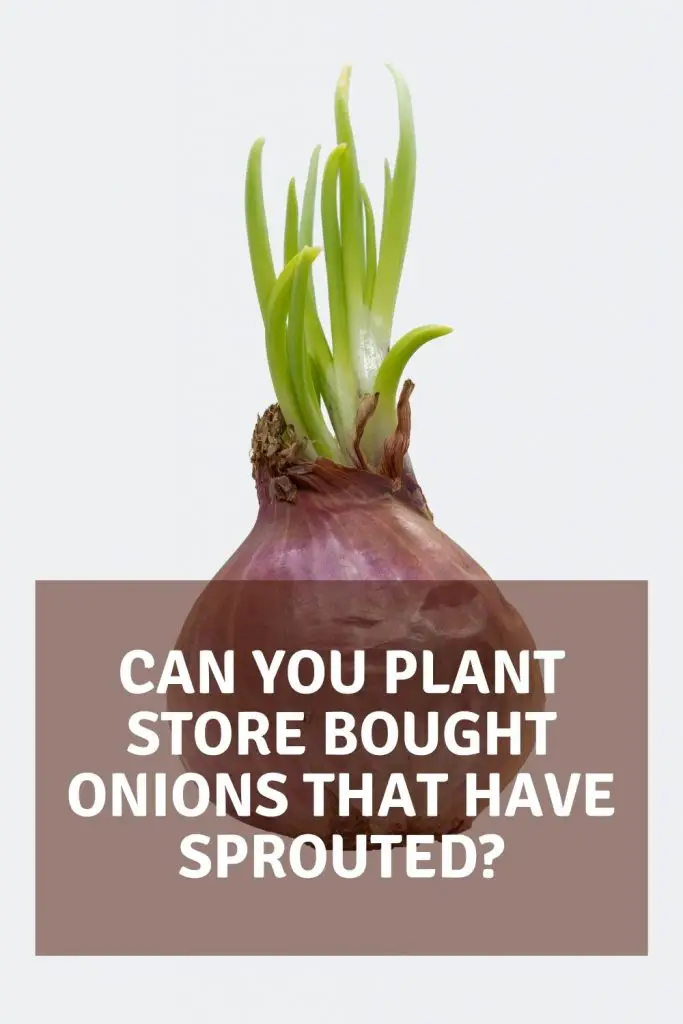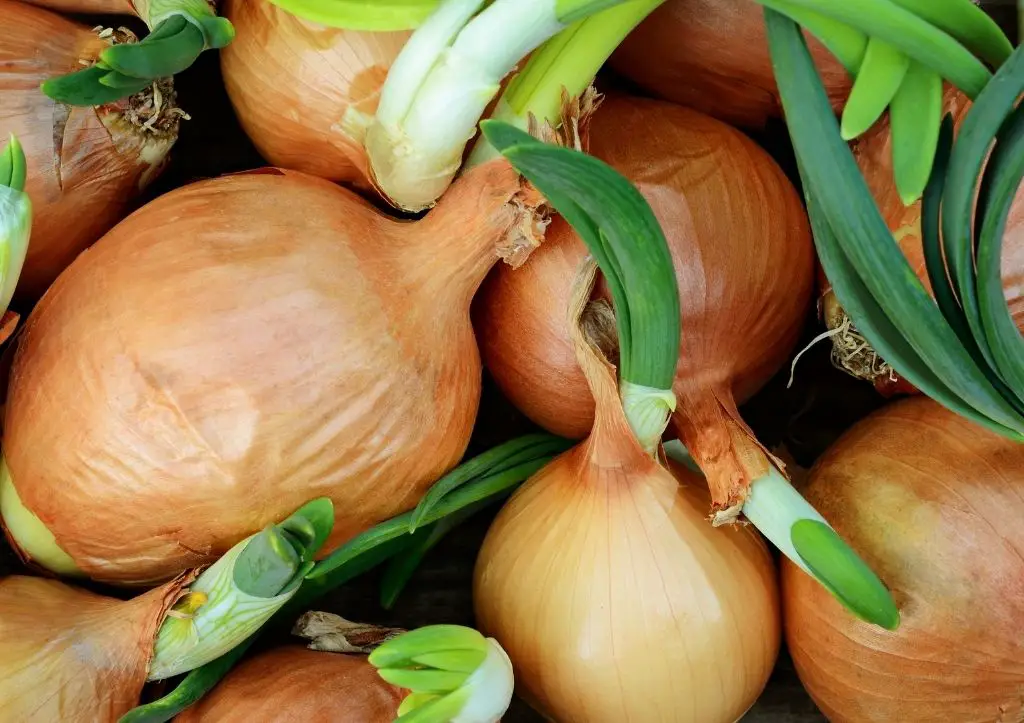If you leave onions in your pantry or cabinet long enough, they will eventually start to sprout and also grow roots.
Unless you use them they will go soft and rot and become useless but what about planting them?
Can you plant onions that have begun to sprout?
You can plant sprouted onions and grow fresh crops, it’s easy to do and is a reliable, cheap way of growing this versatile crop. Simply remove any soft flesh and push the onion into some firm ground in a sunny spot making sure that it is secure. It will soon grow.

Store bought onions will soon begin to sprout if they are not used and this is normally accompanied by a softening of the flesh, which tends to make them unsuitable for use in the kitchen.
Rather than throw them away, you can plant these onions in your garden, or even in containers, to grow new, fresh onions.
I have done this many times myself and have enjoyed varied crops of mature onions at the end of the summer months and have found this to be a good, cheap alternative to growing onions from seeds or sets.
How do you prepare an onion that has already sprouted for planting?
Before you plant your sprouted onions you will need to remove any soft or rotten flesh.
Peel away the layers of soft flesh until you reach the firmer flesh beneath the outer layers.
Look carefully at the formation of the shoots too as you do this as you may see that you can separate the shoots and main body of the onion into two or more young plants – which means that you’ll have more onions to plant.
Planting your onions
Onions like a firm soil that will hold their roots securely and is in a good, warm and sunny spot.
If you are already growing onions on your garden and you have some space left over then the current onion bed is a good place for your sprouting plants.
Water the soil lightly before planting your onions.
Push the onions gently into the soil without squeezing them, pushing them in far enough that they are held securely by the earth.
They don’t need to be planted deeply, it’s more important that they are secure.
Water the soil once more to settle it around the onions.
Check the plants after a few days to make sure that they are still secure, as their roots grow they can push themselves out of the soil, if this happens then gently firm soil around the base of the onion to secure it.
Continue to water your precious new plants every couple of days until they are established and growing well – usually about two weeks.
When should you plant onions?
You can plant onions at almost any time of the year providing that the soil is not waterlogged.
I find that early spring, when I’m planting my peas, or late in summer are two good times to sow onions in my garden.
The autumn months are also good for planting onions but there is a risk of them rotting if the soil is waterlogged.
It’s best to wait until the autumn after it has dried out, if you are sure that there will be no more rain or flooding in your area.
Once planted onions can keep on growing over winter and it’s advisable to mulch them although this isn’t essential.
A layer of straw placed around the plants will help to protect them over the winter.
[amazon box=”B07RJ11S3T” template=”horizontal”]
Can you grow sprouted onions in containers?
Yes, you can grow sprouted onions in pots and containers on a windowsill or outside in the garden.
It’s important to use pots that have drainage holes at the base, if there aren’t then add some crocks to the base of your pot which will prevent it from sitting waterlogged.
Put a layer of gravel into your pot first before adding soil to make watering easier too.
Water the pot well before planting your onion and continue to water as necessary until your plant is established, usually about two weeks.
Do you need to feed onion plants?
It’s usually fine to just feed your plant with water throughout the growing season, but if you are really keen on giving them an extra boost then use a general purpose fertiliser once they have started to grow well.
What pests and diseases pose a danger?
Onions can succumb to many of the same problems as other alliums such as leeks, although there is one that deserves a special mention.
Flea beetles can be attracted to onion plants and cause damage by eating tiny holes in the leaves and hollowing out the bulbs of your onions.
You can prevent damage by covering young plants with fleece until they are well established.
Onions aren’t attractive to anything else in the garden, so there’s no need to worry about disease either.
If you are worried then look out for slugs and snails which may eat into the leaves of your plant or just nibble at them, but they aren’t usually a problem.
How long do onions take to grow?
Onions take around three months to grow and mature, if you plant your sprouted onions in early Spring then they will be ready to harvest in June or July.
Once planted onions can keep on growing over winter and it’s advisable to mulch them although this isn’t essential.
A layer of straw placed around the plants will help to protect them over the winter.
How do you harvest onions?
The best time to harvest your crop is once the leaves begin to wither and turn brown, making it easy for you to spot.
By this time the onions will be around the size of a tennis ball or larger but don’t be concerned if they are smaller, you can still use them or you could even plant these to grow another crop.
Gently lift the onions with a garden fork and then leave the bulbs in the sun for a couple of hours to dry before storing or using as necessary.
Final Words
Planting sprouting onions from the store is an easy and cheap way of growing your own crop and exploring different varieties of onions that you may not find at the garden centre.
A quick and easy crop for the less experienced gardener, it’s a great way to find out which varieties you like best.




